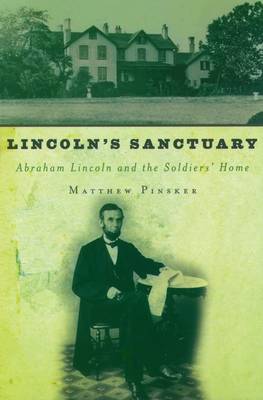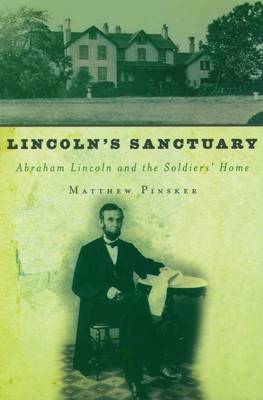
- Afhalen na 1 uur in een winkel met voorraad
- Gratis thuislevering in België vanaf € 30
- Ruim aanbod met 7 miljoen producten
- Afhalen na 1 uur in een winkel met voorraad
- Gratis thuislevering in België vanaf € 30
- Ruim aanbod met 7 miljoen producten
Zoeken
€ 20,45
+ 40 punten
Omschrijving
After the heartbreaking death of his son Willie, Abraham Lincoln and his family fled the gloom that hung over the White House, moving into a small cottage in Washington, D.C., on the grounds of the Soldiers' Home, a residence for disabled military veterans. In Lincoln's Sanctuary, historian Matthew Pinsker offers a fascinating portrait of Lincoln's stay in this cottage and tells the story of the president's remarkable growth as a national leader and a private man.
Lincoln lived at the Soldiers' Home for a quarter of his presidency, and for nearly half of the critical year of 1862, but most Americans (including many scholars) have not heard of the place. Indeed, this is the first volume to specifically connect this early "summer White House" to key wartime developments, including the Emancipation Proclamation, the firing of McClellan, the evolution of Lincoln's "Father Abraham" image, the election of 1864, and the assassination conspiracy. Through a series of striking vignettes, the reader discovers a more accessible Lincoln, demonstrating what one visitor to the Soldiers' Home described as his remarkable "elasticity of spirits." At his secluded cottage, the president complained to his closest aides, recited poetry to his friends, reconnected with his wife and family, conducted secret meetings with his political enemies, and narrowly avoided assassination attempts. Perhaps most important, he forged key friendships that helped renew his flagging spirits. The cottage became a refuge from the pressures of the White House, a place of tranquility where Lincoln could refresh his mind.
Based on research in rarely tapped sources, especially the letters and memoirs of people who lived or worked at the Soldiers' Home, Lincoln's Sanctuary offers the unexpected--a completely fresh view of Abraham Lincoln--through the window of a place that helped shape his presidency.
Lincoln lived at the Soldiers' Home for a quarter of his presidency, and for nearly half of the critical year of 1862, but most Americans (including many scholars) have not heard of the place. Indeed, this is the first volume to specifically connect this early "summer White House" to key wartime developments, including the Emancipation Proclamation, the firing of McClellan, the evolution of Lincoln's "Father Abraham" image, the election of 1864, and the assassination conspiracy. Through a series of striking vignettes, the reader discovers a more accessible Lincoln, demonstrating what one visitor to the Soldiers' Home described as his remarkable "elasticity of spirits." At his secluded cottage, the president complained to his closest aides, recited poetry to his friends, reconnected with his wife and family, conducted secret meetings with his political enemies, and narrowly avoided assassination attempts. Perhaps most important, he forged key friendships that helped renew his flagging spirits. The cottage became a refuge from the pressures of the White House, a place of tranquility where Lincoln could refresh his mind.
Based on research in rarely tapped sources, especially the letters and memoirs of people who lived or worked at the Soldiers' Home, Lincoln's Sanctuary offers the unexpected--a completely fresh view of Abraham Lincoln--through the window of a place that helped shape his presidency.
Specificaties
Betrokkenen
- Auteur(s):
- Uitgeverij:
Inhoud
- Aantal bladzijden:
- 272
- Taal:
- Engels
Eigenschappen
- Productcode (EAN):
- 9780195179859
- Verschijningsdatum:
- 20/01/2005
- Uitvoering:
- Paperback
- Formaat:
- Trade paperback (VS)
- Afmetingen:
- 155 mm x 231 mm
- Gewicht:
- 408 g

Alleen bij Standaard Boekhandel
+ 40 punten op je klantenkaart van Standaard Boekhandel
Beoordelingen
We publiceren alleen reviews die voldoen aan de voorwaarden voor reviews. Bekijk onze voorwaarden voor reviews.











